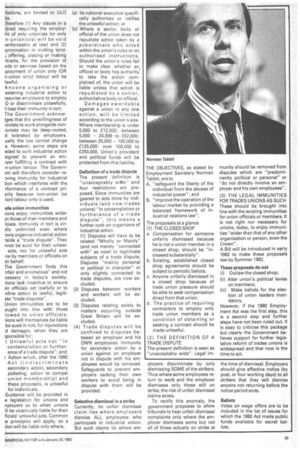THE OBJECTIVES, as stated by Employment Secretary Norman Tebbit, are
Page 25

If you've noticed an error in this article please click here to report it so we can fix it.
to A, "safeguard the liberty of the individual from the abuses of industrial power"; and B, "improve the operation of the labour market by providing a balanced framework of industrial relations law".
The proposals at a glance (1) THE CLOSED SHOP a. Compensation for someone unfairly dismissed because he is not a union member in a closed shop, should be "increased substantially".
b. Existing, established closed shop agreements should be subject to periodic ballots.
c. Anyone unfairly dismissed in a closed shop because of trade union pressure should be able to seek compensation direct from that union.
d. The practice of requiring contractors to employ only trade union members as a condition of obtaining or seeking a contract should be made unlawful.
(2) THE DEFINITION OF A TRADE DISPUTE The present definition is seen as "unacceptably wide". Legal im munity should be removed from disputes which are "predominantly political or personal" or "do not directly involve an employer and his own employees".
(3) THE LEGAL IMMUNITIES FOR TRADES UNIONS AS SUCH These should be brought into line with the existing immunities for union officials or members. It is not right nor necessary for unions, today, to enjoy immunities "wider than that of any other organisation or person, even the Crown".
A Bill will be introduced in early 1982 to make these proposals law by Summer 1982.
These proposals do not (i) Outlaw the closed shop; (ii) Alter union's political levies on members; OW Make ballots for the election of union leaders mandatory.
However, if the 1980 Employment Act was the first step, this is a second step and further steps have not been ruled out. It is easy to criticise this package but clearly the Government believes support for further legislative reform of trades unions is widespread and that now is the time to act.




































































